 “Drawing from his bosom a locket, which was attached to a slight steel chain, he opened it and showed me a tress of golden hair. “In this curl is clasped the history of my life, friend,’ he said, with calm sorrow. “’Tis only a woman’s hair,’ as poor Swift wrote once; yet it is this which has made me what I am. God rules us all. He makes us very weak, that, in our weakness, He may make His own strength perfect. To one comes joy and laughter; to another tears. I accept my part, and bow to Him who is Lord of all” – Anonymous, 1859
“Drawing from his bosom a locket, which was attached to a slight steel chain, he opened it and showed me a tress of golden hair. “In this curl is clasped the history of my life, friend,’ he said, with calm sorrow. “’Tis only a woman’s hair,’ as poor Swift wrote once; yet it is this which has made me what I am. God rules us all. He makes us very weak, that, in our weakness, He may make His own strength perfect. To one comes joy and laughter; to another tears. I accept my part, and bow to Him who is Lord of all” – Anonymous, 1859Jewelry incorporating human hair have been in existence since at least the 1500s. They probably share a cultural lineage with Christian relics, which housed various body parts of saints or martyrs and were believed to possess spiritual power. Early hairwork jewelry from the sixteenth and seventeenth centuries were frequently love tokens or mourning jewelry incorporating the hair of a loved one rather than a saint, and they often included momento mori symbolism. Hairwork jewelry became popular in Europe and America after 1760 and extremely popular after the industrial revolution provided the middle classes with less expensive, mass produced jewelry findings. It is a common mistake to assume that all hairwork jewelry were mourning objects. In this latter period, hairwork jewelry provided a sentimental memorial to love, friendship, family, celebrity, and, of course, mourning.
Hairwork jewelry designed and executed on an artist’s palette is referred to as “palette worked.” The designs produced by palette work range from simple basket weaves to extremely intricate and symbolic or allegorical scenes.
Illustration plate demonstrating a step in the art of palette working hair from Alexanna Speight's (1872) The Lock of Hair.
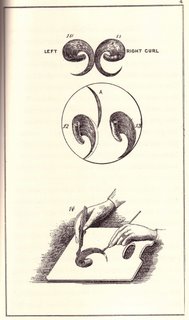
Georgian brooch containing two palette worked curls mounted on blue enamel backed by embossed foil.
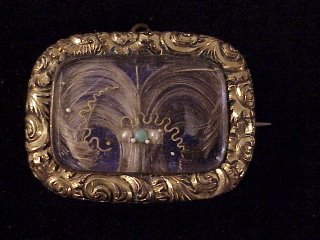
This pendent brooch contains a palette worked forget-me-not and curl on translucent milk glass backed by embossed red foil.
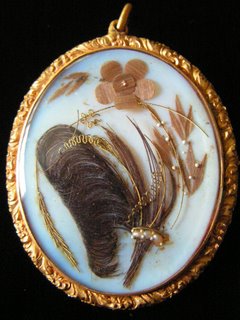
On the reverse, there are two hairwork curls each labeled with initials, “E.O.” and “H.C.O.,” spelled out in tiny seed pearls on translucent blue enamel plaques backed with embossed foil.
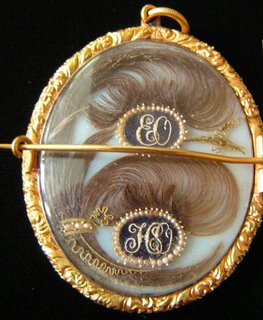
This brooch contains a beautiful palette worked feather sculpted from red hair with flower, branch, and the initials “B.P.” on opalescent glass.
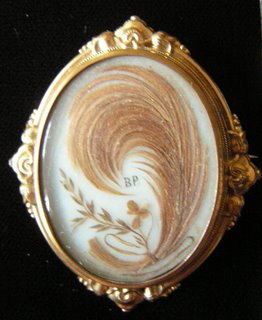
No comments:
Post a Comment